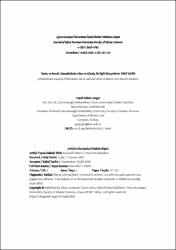| dc.contributor.author | Gezgin, Yusuf Erdem | |
| dc.date.accessioned | 2021-07-14T10:05:36Z | |
| dc.date.available | 2021-07-14T10:05:36Z | |
| dc.date.issued | 2020 | en_US |
| dc.identifier.citation | Gezgin, Yusuf Erdem . "Harâc ve Emvâl Literatüründe Altın ve Gümüş ile İlgili Rivayetlerin Fıkhî Tahlili". Afyon Kocatepe Üniversitesi İslami İlimler Fakültesi Dergisi 3 / 2 (Aralık 2020): 137-154 . | en_US |
| dc.identifier.uri | https://dergipark.org.tr/tr/pub/akid/issue/58121/763231 | |
| dc.identifier.uri | https://hdl.handle.net/11630/8869 | |
| dc.description.abstract | Kıymetli iki maden olan altın ve gümüş sünnette ribevî mallar arasında sayılmıştır. Fukahanın
çoğunluğu bu iki madeni bütün çeşitleriyle ribevî olarak kabul etmiş ve sarf akdi kuralları
kapsamında mübadele edilmesi gerektiğini ifade etmişlerdir. Fakat bir kısım fakihler bu görüşten
farklı düşünmekte ve altınla gümüşün bazı türlerinin ribevî olmadıklarını iddia etmektedirler.
Harâc ve emvâl literatürünün dört temel eserinde altın ve gümüş konularının ele alındığı bu
makalede ilgili görüş farklılıklarına değinilmemiş; sadece altın ve gümüşün fıkhî mahiyetiyle
alakalı ihtilafların tarihsel izleri takip edilmiştir. Bu çerçevede çalışmamızda Ebû Yusuf’un (ö.
182/798) Kitâbu’l-Harâc, Yahyâ b. Âdem’in (ö. 203/818) Kitâbu’l-Harâc, Ebû Ubeyd Kâsım b.
Sellâm’ın (ö. 224/838) Kitâbu’l-Emvâl ve İbn Zencûye’nin (ö. 251/865) Kitâbu’l-Emvâl adlı eserleri
incelenmiştir. Böyle bir araştırmayla, fıkıh ilminin gelişim süreçleri içerisinde altın ve gümüşün
fıkhî mahiyetiyle ilgili farklı kanaatlerin ilk dönemdeki izleri sürülmüştür. Zira hicri VIII. asra
kadar bu iki madenin ribevî/para olmaları yönünde bir tartışmanın bulunmadığı
düşünülmektedir. Bu düşünceyle ilgili objektif bir sonuca ulaşmak amacıyla söz konusu dört
temel eser eksenli bir araştırma yapılmıştır. | en_US |
| dc.description.abstract | Gold and silver are two precious metals, which are counted among the ribawi (subject to
interest) goods in sunnah. The majority of fukaha accepted these two metals as ribawi and stated
with all diversity that it should be exchanged under the consumable contract rules. However,
some of the scholars deviated from this view and claimed that some species of gold and silver
are not ribawi. In this regard, this article covers the subjects of gold and silver in four essential
works of the literature on kharāj (taxation) and amwal (revenue); Kitāb al-Kharāj of Abū Yūsuf (d.
182/798), Kitāb al-Kharāj of Yaḥyā ibn Ādam (d. 203/818), Kitāb al-Amwal of Abū ʻUbayd al-Qāsim
ibn Sallām (d. 224/838), and Kitāb al-Amwal of Ibn Zanjūyah (d. 251/865). Keeping the different
opinions out of scope, we focus on historical traces of conflicts related to the nature of gold and
silver. In this way, different convictions about fiqh-related nature of gold and silver were traced
through the development processes of fiqh science. Because it is thought that there is no
argument over ribawi or money nature of these two mines until VIII. Hijri century. Therefore, a
survey of these four essential works was conducted in order to achieve an objective conclusion
about this issue. | en_US |
| dc.language.iso | tur | en_US |
| dc.publisher | Afyon Kocatepe Üniversitesi | en_US |
| dc.rights | info:eu-repo/semantics/openAccess | en_US |
| dc.subject | İslam hukuku | en_US |
| dc.subject | Altın | en_US |
| dc.subject | Gümüş | en_US |
| dc.subject | Harâc | en_US |
| dc.subject | Emvâl | en_US |
| dc.title | Harâc ve Emvâl literatüründe altın ve gümüş ile ilgili rivayetlerin fıkhî tahlili | en_US |
| dc.title.alternative | Jurisprudence analysis of narrations about gold and silver in Kharac and Amval literature | en_US |
| dc.type | article | en_US |
| dc.relation.journal | Afyon Kocatepe Üniversitesi İslami İlimler Fakültesi Dergisi | en_US |
| dc.department | Seçiniz | en_US |
| dc.authorid | 0000-0002-0221-8965 | en_US |
| dc.identifier.volume | 3 | en_US |
| dc.identifier.startpage | 137 | en_US |
| dc.identifier.endpage | 154 | en_US |
| dc.identifier.issue | 2 | en_US |
| dc.relation.publicationcategory | Makale - Ulusal Hakemli Dergi - Başka Kurum Yazarı | en_US |



















